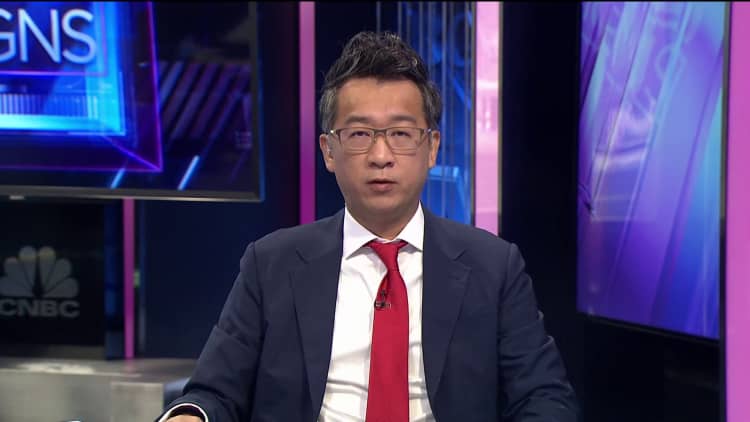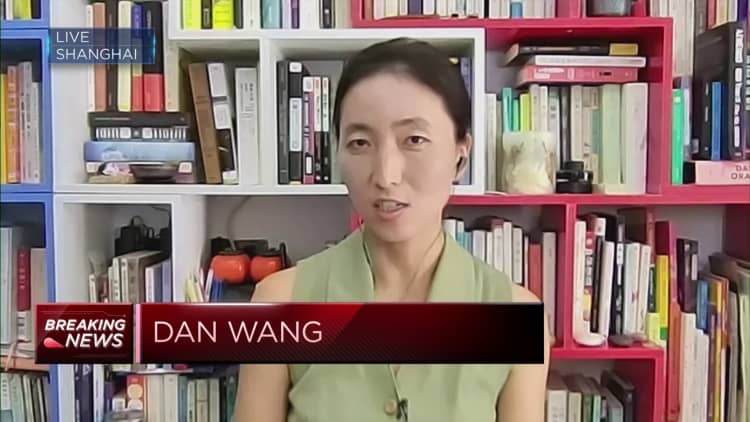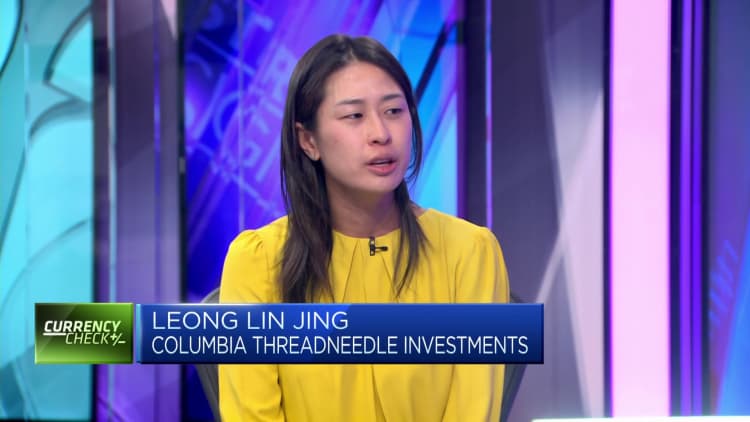Fears are growing that China’s economy is tethering on the verge of deflation after yet another slate of underwhelming economic data July 17 provided more evidence that the stall in growth momentum may turn out more severe without more meaningful policy intervention.
Xinhua News Agency | Xinhua News Agency | Getty Images
Fears are growing that China’s economy is tethering on the verge of deflation after another slate of underwhelming economic data provided more evidence of stagnating growth, renewing calls for more meaningful policy intervention.
On Monday, Beijing announced that GDP for the second quarter grew 6.3% from a year ago, missing market expectations for 7.3%. This also marked a 0.8% growth from the first quarter, slower than the 2.2% quarter-on-quarter pace recorded in the first three months of the year.
“We need to see broad and persistent price pressure before we can declare deflation,” said Hong Hao, Grow Investment Group’s chief economist. “This is happening in the upstream sectors and it normally takes two to four quarters to pass down.”
“I think we are on the verge of deflation. Now it’s the time to act to stem the deflationary pressure,” he added.

Hong pointed to official data last week showing that China’s producer prices fell 5.4% in June from a year earlier and slipped 0.8% from a month ago — falling below analysts’ expectations. The annual decline in June was China’s ninth consecutive drop and its steepest since December 2015.
Annual consumer price inflation was flat in June — driven by a 7.2% drop in pork prices — missing Reuters’ expectations for a 0.2% rise and weaker than the 0.2% rise in May.
China pushback
The People’s Bank of China pushed back on the deflation thesis last week.
“At this time there is no deflation, and there will be no risk of deflation in the second half of the year,” Liu Guoqiang, deputy governor of the PBOC, told reporters last week. He pointed to factors such as China’s economic recovery and growth in money supply.
Chinese banks extended 1.81 trillion yuan ($258.23 billion) in new yuan loans in June, up 22% from May.
Still, some economists are pointing to other indicators.

“Nominal GDP growth turns out to be lower than real GDP growth in Q2, the first time since comparable data are available in Q4 2016,” said Zhang Zhiwei, Pinpoint Asset Management’s president and chief economist. “This indicates that risk of deflation is serious.”
Nominal gross domestic product measures economic activity without adjustment for inflation.
Economists at Citi and Macquarie also flagged the risk of sagging prices in the world’s second-largest economy following Monday’s release.
Read more about China from CNBC Pro
However, Macquarie economists Larry Hu and Yuxiao Zhang characterized the condition in China as disinflation — a temporary slowdown of rising prices — rather than deflation, which refers to a more serious problem where there’s a persistent decrease in prices over time.
“Disinflation pressure is evident, as nominal GDP growth slowed to 4.8% year on year in 2Q from 5.0% in 1Q. It’s the first time since the second quarter of 2020 that the GDP deflator has turned negative,” Hu and Zhang wrote in their assessment of Monday’s data release.
More downgrades
A raft of other June data have pointed to a weak prognosis. Even though top-line fixed asset investment and industrial output figures marginally exceeded market expectations, there was a worrying deepening decline in property investment.
Even with a low base from last year, given the Covid lockdown in Shanghai, retail sales slowed to 3.1% in June from a year before, compared to 12.7% in May.

Monday’s disappointing data triggered another slew of downgrades by Wall Street banks, including Barclays, Citi, Morgan Stanley and JP Morgan.
Economists cut their forecast for China’s annual growth, underscoring the depth of the exuberance on China’s economic recovery when it emerged from strict zero Covid curbs late last year.
Citi, Morgan Stanley and JP Morgan now expect China’s annual growth print this year to come in at 5%, while Barclays trimmed its forecast from 5.3% to 4.9%.
— CNBC’s Evelyn Cheng contributed to this report.
Ngày nay, Triển vọng ngày càng suy giảm của giá trị hàng hoá Trung Quốc đã được các nhà kinh tế ngành đồng loạt đánh giá là “nghiêm trọng”. Theo một nhà kinh tế, khoảng thời gian này đã đến lúc “hành động”.
Hàng hoá Trung Quốc đã giảm mạnh trong vòng năm tháng qua, theo sự miêu tả bởi trung tâm phân tích Citi Global Markets. Việc này đã kích thích tin tức về hồi sinh chậm và thị trường bị xao lãnh một cách nghiêm trọng.
Nhà kinh tế quan chức John Liu cho biết rằng, “Giá trị của toàn bộ hàng hóa Trung Quốc hiện đang tăng trưởng chậm hơn, nhất là trong hàng hóa cấp khác nhau. Bắt đầu từ tháng 6 đến tháng 8, sự suy giảm gần như liên tục của giá trị toàn bộ hàng hóa Trung Quốc đã tăng. Những bảng biểu cho thấy sự suy giảm từ từ trước đây đã trở nên nghiêm trọng hơn. ”
Theo đó, trung tâm phân tích rằng trung bình các nhà sản xuất hàng hoá trong thời gian qua đã xuất hiện trong các cấp hàng hóa cấp 1 tới cấp 4, được cải thiện nhưng đã không đủ để cải thiện giá trị sự suy giảm hiện nay.
“Hành động phải được thanh đạm ngay lập tức để chống lại sự suy giảm suốt thời gian này,” đặc khu John Liu nhấn mạnh.
Điều này hoàn toàn có thể được đạt được bởi việc đối phó với sự suy giảm hiện tại, từ các khoản đầu tư về kinh tế cho đến việc áp dụng chính sách hạn chế thuế, cũng như các biện pháp cải thiện chất lượng dịch vụ và sản phẩm.
Vì vậy, có rất nhiều các đặc biệt sẽ góp phần tạo nên cách xử lý và cải thiện tình hình hiện tại của giá trị hàng hoá Trung Quốc. Với tinh thần khí hậu về “hành động” của các nhà kinh tế, sẽ giúp giảm bớt sự trái với ý thức và cho phép Trung Quốc điểm danh thành một trong các trình độ kinh tế lớn nhất trên thế giới.
